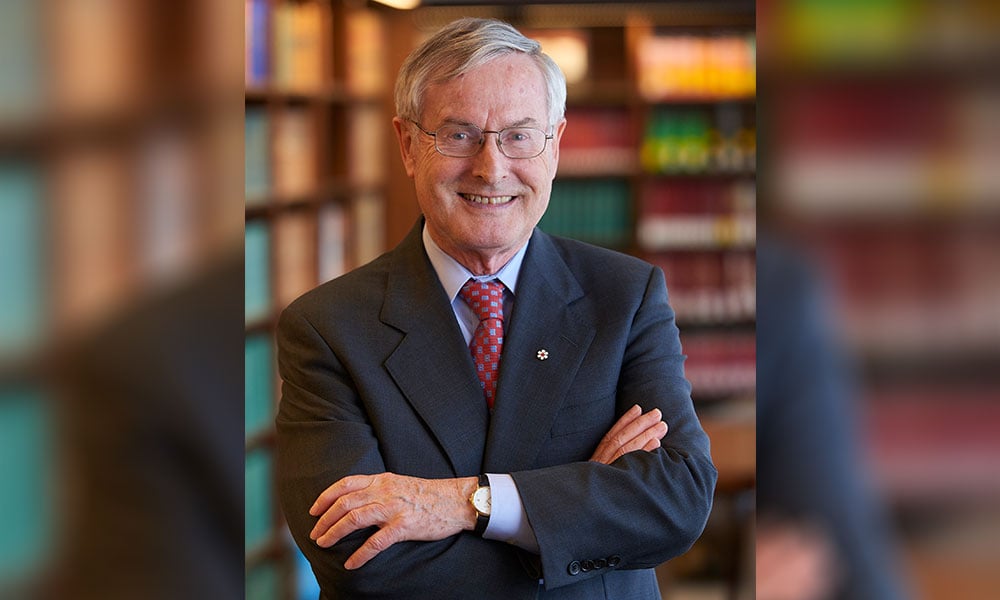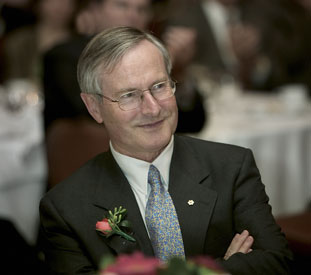
Hogg's Constitutional Law of Canada is the most cited book in the history of the Supreme Court of Canada

Peter Hogg, legal scholar, lawyer and leading authority on constitutional law in Canada, died in Toronto on Feb. 4; he was 80 years old.
Hogg was dean emeritus and professor emeritus of Osgoode Hall Law School, scholar in residence at Blake, Cassels & Graydon LLP, an advisor to prime ministers who appeared often before the Supreme Court of Canada, and author of the seminal Constitutional Law of Canada, among other works.
Emmett Macfarlane, a constitutional law professor at the University of Waterloo, calls Hogg’s impact on constitutional law and legislation in Canada “immeasurable.”
“I can’t think of a field of inquiry or academic area or law that has such a single, influential person,” Prof. Macfarlane told Canadian Lawyer. If Canadian constitutional experts were asked who the pre-eminent thinker was, “everyone would say, Peter Hogg.
“His core text (Constitutional Law of Canada) and other writing have left a huge impact on our jurisprudence,” Macfarlane says. “He was the most cited living scholar in Supreme Court jurisprudence and all the way down the hierarchy.
“In constitutional law alone, he spurred a wealth of insight, and the creation of concepts like the famous dialogue of metaphor for explaining the relationship between the different branches of government as it relates to the Charter of Rights,” he says. “He wrote on pretty much every section of the Charter, from the notwithstanding clause to section 7 [on] life, liberty and security of the person.”
In addition, says Macfarlane, Hogg “wrote about judicial review itself” prior to and after the Constitution Act, 1982, which enshrined the Charter of Rights and Freedoms and “so transformed the role of courts in this country. So he wasn’t just read in the narrow confines of legal journals, … but read quite widely by political scientists as well.”
As a scholar, Hogg “was very aware of the separate jurisdiction of legislature and judiciary, and tried to respect the separate [powers],” says Mary Condon, dean of Osgoode Hall Law School. “He wanted the legislature and parliament to do what it does best, and have the judiciary assess that work based on the core principles of constitutional law. At one point in his career he wrote of this as a dialogue as parliament on one hand, courts on the other, and how that dialogue could be made most productive.
“The thing that really marks him out from others is the fact that he really valued clarity of thought and expression,” Dean Condon adds. “He spent a lot of time thinking about what he wanted to say, orally and in writing, and … could express ideas very clearly and cogently.”
Hogg was also a “beloved professor,” she says, who taught constitutional law as well as tax and trust law at the school before retiring, as dean, in 2003.
In response to the school’s announcement of his death to its alumni, “I have been receiving large numbers of response[s] from many people who remember him fondly. It's been really heart-warming to see how many fond memories our alumni have about Peter and his teaching and mentorship.”

Condon recalls Hogg as being generous with his advice to her when she was a young professor at Osgoode Hall. “He gave me practical advice as to how I could improve as a teacher; I still recall it today,” she says. “After a class, he would always go back to his office and make notes as to what had gone well and less well, so that next time he came to teach that topic,” he could improve. “It was very practical and useful advice for young teachers.”
Hogg was appointed a professor of Law at Osgoode Hall in 1970 and became dean in 1998. On his retirement in 2003 he joined Blake, Cassels & Graydon LLP as a scholar in residence.
In that role he served as “an internal professor,” but also as counsel for the firm.
“Half of his work was academic and educational,” says Brad Berg, partner and Practice Group Leader for Litigation & Dispute Resolution at Blake, Cassels & Graydon LLP in Toronto, whose office was down the hall from Hogg’s. “He would write, teach, both internally to our lawyers and externally with clients.” He continued to maintain his textbooks while in this role as well.
The other half of his time was spent “very much lawyering,” says Berg. Hogg would be brought in, often at a client’s request, on some of the firm’s toughest cases -- Supreme Court of Canada appeals, complex opinions – and on the more commercial side: strategic board advice, reputational risk issues, and more.
“One of the reasons why his loss has hit us so hard is that he was part of the litigation group,” but the corporate, securities and tax lawyers also used Hogg’s expertise, Berg adds; “he was a Renaissance man, and he was just extremely smart.”
Many of the cases Hogg worked on were “some of the most famous cases in modern times,” says Berg. He was counsel on the Meech Lake Accord and Charlottetown Accord, the Reference Re Manitoba Language Rights before the Supreme Court, Adler v Ontario (AG), the Ontario separate school funding case, the same-sex marriage reference, the national securities regulator case, and the Trans Mountain Pipeline decision handed down by the Federal Court of Appeal in early February. He was also counsel to Paul Martin when he was prime minister, and to Stephen Harper in the runup to the appointment of Marshall Rothstein as a puisne justice of the Supreme Court.
“Peter worked here at Blakes right up until Christmas,” says Berg; “he was 80 years old, but coming into the office almost every day, still working right up until the very end. He was prodigious.”
Colleagues also remember Peter Hogg as a warm, approachable and humble man. Berg says Hogg knew and was friendly with all the staff at Blakes, from the most senior partner to the mailroom staff.
Hogg garnered a raft of distinctions over the course of his career. Born on March 12, 1939 in Lower Hutt, New Zealand, he attended Nelson College, graduating in 1956. He earned an LLB from the University of New Zealand in 1962, an LLM from Harvard Law School in 1963, and a PhD from Monash University in Melbourne, Australia, in 1970.
He is survived by his wife, Fran, whom he met while they were both students at Harvard; a daughter, Anne, of Toronto; and a son, David, who is an astrophysics professor at New York University.
“They had a real partnership,” says Berg of the Hoggs’ union; “a real, wonderful marriage.”
In its announcement of Hogg’s death, Osgoode Hall notes that Hogg’s Constitutional Law of Canada (Carswell, 4th ed., 1997) was the most cited book in the history of the Supreme Court of Canada. He also authored Liability of the Crown (Carswell, 3rd ed., 2000 with former Osgoode Hall Law School Dean Patrick J. Monahan), as well as other books and articles.
“Peter Hogg stands alone in constitutional law,” says Macfarlane. “I can’t think of another area where you would so easily identify the leading thinker.”